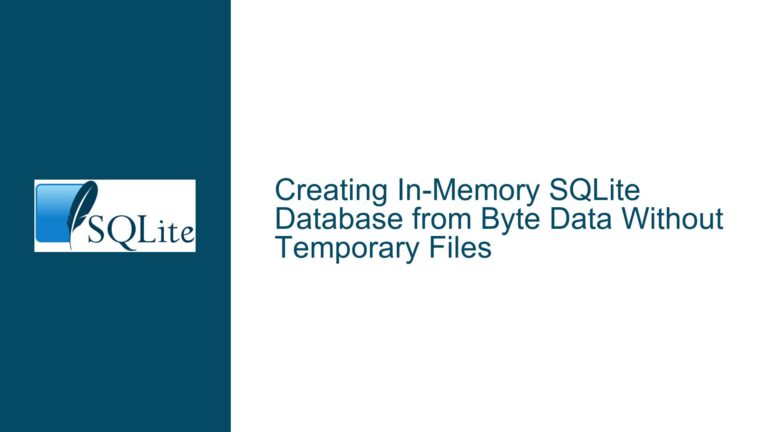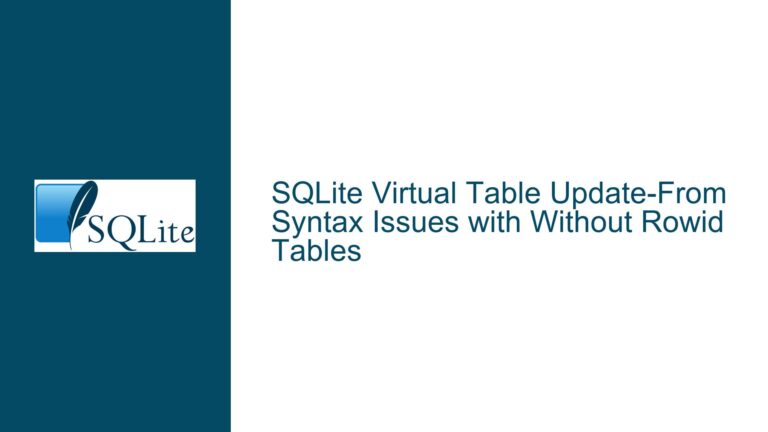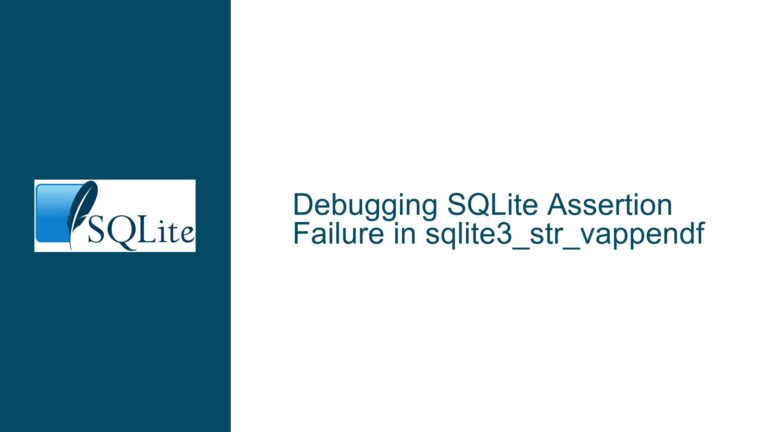Addressing SQLite Client Data Safety and Namespace Collisions
Issue Overview: SQLite Client Data Safety and Namespace Collisions
The core issue revolves around the safety and reliability of the sqlite3_set_clientdata and sqlite3_get_clientdata APIs in SQLite, particularly when multiple libraries or language bindings (e.g., Python, TCL, Rust) interact with the same SQLite connection. The primary concern is the potential for namespace collisions and the resulting risks of memory corruption, segmentation faults, or undefined behavior when client data is shared or accessed across different libraries.
The sqlite3_set_clientdata API allows a client to attach arbitrary data to a SQLite connection using a name (a string) and a pointer to the data. The sqlite3_get_clientdata API retrieves this data using the same name. However, there is no built-in mechanism to ensure that the data retrieved is of the expected type or format. This becomes problematic when multiple libraries or language bindings use the same connection and attempt to share or coordinate data using this mechanism.
For example, a Python library might store a PyObject * under a specific name, while a TCL library might store an integer under the same name. When the Python library retrieves the data, it assumes it is a PyObject *, but it could instead be an integer, leading to a crash or memory corruption. This issue is exacerbated by the fact that developers in higher-level languages (e.g., Python, TCL) may not be aware of the underlying C API details, leading to accidental misuse or copy-paste errors.
The current API lacks a mechanism to verify the type or format of the data, making it unsafe for cross-library coordination. While the documentation suggests using obscure or secret names to avoid collisions, this is not a robust solution, as names can be easily guessed or discovered, especially in open-source projects. Additionally, the API does not provide a way to programmatically verify that the data was set by the same library or codebase, further increasing the risk of accidental or malicious misuse.
Possible Causes: Namespace Collisions and Lack of Type Safety
The root cause of the issue lies in the design of the sqlite3_set_clientdata and sqlite3_get_clientdata APIs, which do not provide any built-in mechanism for type safety or namespace isolation. This leads to several potential problems:
Namespace Collisions: When multiple libraries or language bindings use the same SQLite connection, they may inadvertently use the same name to store different types of data. For example, a Python library might store a
PyObject *under the name "context", while a TCL library might store an integer under the same name. When the Python library retrieves the data, it assumes it is aPyObject *, but it could instead be an integer, leading to a crash or memory corruption.Lack of Type Safety: The API does not provide any mechanism to verify the type or format of the data. When a library retrieves data using
sqlite3_get_clientdata, it has no way to ensure that the data is of the expected type. This is particularly problematic when data is shared between libraries, as each library may have different expectations about the format of the data.Accidental Misuse: Developers in higher-level languages (e.g., Python, TCL) may not be aware of the underlying C API details, leading to accidental misuse or copy-paste errors. For example, a developer might copy code from one library to another without realizing that the same name is being used to store different types of data.
Malicious Misuse: While the API is not intended for use by malicious actors, it is possible for a malicious extension to overwrite or corrupt client data. This could be done by using the same name to store malicious data, or by directly manipulating the pointer returned by
sqlite3_get_clientdata.Cross-Library Coordination: The API is sometimes used as a mechanism for cross-library coordination, where different libraries share data using the same name. However, this is inherently unsafe, as there is no way to ensure that the data is of the expected type or format. This can lead to crashes or memory corruption when the data is accessed by a different library.
Troubleshooting Steps, Solutions & Fixes: Enhancing Safety and Reliability
To address the issues of namespace collisions and lack of type safety in the sqlite3_set_clientdata and sqlite3_get_clientdata APIs, several solutions and fixes can be considered. These solutions aim to enhance the safety and reliability of the API while maintaining its flexibility and ease of use.
1. Introduce a Magic Number or Type Identifier
One proposed solution is to introduce a 64-bit magic number or type identifier as an additional parameter in the sqlite3_set_clientdata and sqlite3_get_clientdata APIs. This magic number would be used to verify that the data retrieved is of the expected type. When a library sets client data, it would provide a magic number that uniquely identifies the type of the data. When the data is retrieved, the library can verify that the magic number matches the expected value before dereferencing the pointer.
For example, the sqlite3_set_clientdata API could be modified as follows:
int sqlite3_set_clientdata(
sqlite3 *db, /* Attach client data to this connection */
const char *zName, /* Name of the client data */
void *pData, /* The client data itself */
uint64_t magicNumber, /* Magic number to identify the type */
void (*xDestructor)(void*) /* Destructor */
);
Similarly, the sqlite3_get_clientdata API could be modified to return the magic number:
void *sqlite3_get_clientdata(
sqlite3 *db, /* Connection to retrieve data from */
const char *zName, /* Name of the client data */
uint64_t *magicNumber /* Output: magic number */
);
This approach provides an additional layer of safety, as the library can verify that the data is of the expected type before dereferencing the pointer. It also reduces the risk of namespace collisions, as the magic number provides an additional level of uniqueness.
2. Use a Namespace Object or Prefix
Another solution is to introduce a namespace object or prefix that can be used to isolate client data between different libraries or language bindings. This namespace object would be passed as an additional parameter to the sqlite3_set_clientdata and sqlite3_get_clientdata APIs, ensuring that each library uses a unique namespace for its client data.
For example, the sqlite3_set_clientdata API could be modified as follows:
int sqlite3_set_clientdata(
sqlite3 *db, /* Attach client data to this connection */
const char *zName, /* Name of the client data */
void *pData, /* The client data itself */
void *namespace, /* Namespace object */
void (*xDestructor)(void*) /* Destructor */
);
Similarly, the sqlite3_get_clientdata API could be modified to accept a namespace object:
void *sqlite3_get_clientdata(
sqlite3 *db, /* Connection to retrieve data from */
const char *zName, /* Name of the client data */
void *namespace /* Namespace object */
);
This approach ensures that each library uses a unique namespace for its client data, reducing the risk of namespace collisions. It also provides a mechanism for cross-library coordination, as libraries can share a namespace object if needed.
3. Use a sqlite_value Instead of a void *
Another proposed solution is to use a sqlite_value object instead of a void * for client data. The sqlite_value object is a safer and more structured way to store and retrieve data in SQLite, as it includes type information and can be safely manipulated using the SQLite C API.
For example, the sqlite3_set_clientdata API could be modified as follows:
int sqlite3_set_clientdata(
sqlite3 *db, /* Attach client data to this connection */
const char *zName, /* Name of the client data */
sqlite3_value *pData, /* The client data as a sqlite_value */
void (*xDestructor)(void*) /* Destructor */
);
Similarly, the sqlite3_get_clientdata API could be modified to return a sqlite_value:
sqlite3_value *sqlite3_get_clientdata(
sqlite3 *db, /* Connection to retrieve data from */
const char *zName /* Name of the client data */
);
This approach provides a safer and more structured way to store and retrieve client data, as the sqlite_value object includes type information and can be safely manipulated using the SQLite C API. It also reduces the risk of memory corruption or segmentation faults, as the sqlite_value object is managed by SQLite.
4. Implement a Separate Key/Value Store
If the sqlite3_set_clientdata and sqlite3_get_clientdata APIs are not suitable for a particular use case, an alternative solution is to implement a separate key/value store for client data. This key/value store would be managed by the library or language binding, and would not rely on the SQLite API for storing or retrieving client data.
For example, a Python library could implement its own key/value store using a dictionary or other data structure. This approach provides complete control over the storage and retrieval of client data, and eliminates the risk of namespace collisions or type mismatches.
However, this approach may not be suitable for all use cases, particularly when cross-library coordination is required. In such cases, the other solutions (e.g., magic numbers, namespace objects, or sqlite_value objects) may be more appropriate.
5. Document Best Practices and Encourage Safe Usage
Finally, it is important to document best practices and encourage safe usage of the sqlite3_set_clientdata and sqlite3_get_clientdata APIs. This includes:
- Using Unique Names: Developers should use unique names for client data, preferably with a prefix or suffix that identifies the library or language binding. This reduces the risk of namespace collisions.
- Avoiding Cross-Library Coordination: Developers should avoid using the
sqlite3_set_clientdataandsqlite3_get_clientdataAPIs for cross-library coordination, as this is inherently unsafe. Instead, they should use other mechanisms (e.g., message passing, shared memory) for inter-library communication. - Verifying Data Types: When retrieving client data, developers should verify that the data is of the expected type before dereferencing the pointer. This can be done using a magic number, type identifier, or other mechanism.
By following these best practices, developers can reduce the risk of namespace collisions, type mismatches, and other issues when using the sqlite3_set_clientdata and sqlite3_get_clientdata APIs.
Conclusion
The issues of namespace collisions and lack of type safety in the sqlite3_set_clientdata and sqlite3_get_clientdata APIs can be addressed through a combination of technical solutions (e.g., magic numbers, namespace objects, sqlite_value objects) and best practices (e.g., using unique names, avoiding cross-library coordination). By implementing these solutions and encouraging safe usage, developers can enhance the safety and reliability of the API while maintaining its flexibility and ease of use.






